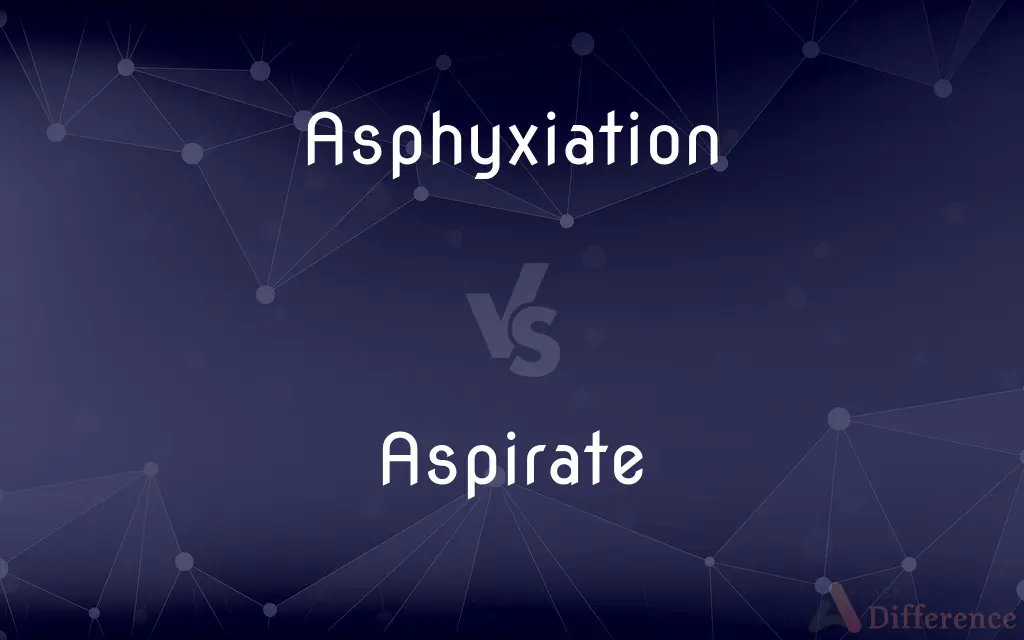Asphyxiation vs. Aspirate — What's the Difference?
By Tayyaba Rehman & Urooj Arif — Updated on May 1, 2024
Asphyxiation is a condition caused by inadequate oxygen supply, whereas to aspirate involves inhaling substances into the lungs.

Difference Between Asphyxiation and Aspirate
Table of Contents
ADVERTISEMENT
Key Differences
Asphyxiation refers to a severe lack of oxygen reaching the body's tissues, typically resulting in unconsciousness or death, while aspirating involves drawing breath or foreign materials, such as fluids or solids, into the airways or lungs.
Asphyxiation can occur in various environments, such as those with smoke or harmful gases, which displace oxygen. On the other hand, aspiration often happens during the inhalation process, especially if the normal reflexes that prevent food or liquid from entering the lungs are compromised.
Risk factors for asphyxiation include environments with restricted airflow or accidental strangulation, whereas risks for aspiration include neurological disorders, swallowing difficulties, or intoxication, which can impair normal swallowing reflexes.
The symptoms of asphyxiation include gasping, inability to speak, and eventual loss of consciousness, while symptoms of aspiration may involve coughing, wheezing, and possibly a lung infection or pneumonia as a secondary complication.
Prevention of asphyxiation focuses on ensuring safe, breathable environments and using protective equipment where necessary. In contrast, preventing aspiration may involve medical interventions like adjusting feeding techniques and postures in individuals at risk.
ADVERTISEMENT
Comparison Chart
Definition
Inadequate oxygen supply causing suffocation.
Inhalation of foreign substances into lungs.
Causes
Choking, drowning, carbon monoxide poisoning.
Swallowing difficulties, neurological issues.
Symptoms
Difficulty breathing, cyanosis, loss of consciousness.
Coughing, wheezing, potential pneumonia.
Prevention
Adequate ventilation, avoiding confined spaces.
Proper eating techniques, medical care.
Risk Factors
Confined spaces, exposure to harmful gases.
Impaired swallowing, age, neurological damage.
Compare with Definitions
Asphyxiation
Lack of oxygen leading to unconsciousness or death.
Smoke from the fire caused severe asphyxiation.
Aspirate
In linguistics, referring to pronunciation involving a strong breath.
In some languages, aspirated sounds are critical for meaning.
Asphyxiation
A result of environmental oxygen displacement.
In the sealed room, carbon dioxide levels rose, leading to asphyxiation.
Aspirate
The act of removing substances from the body using suction.
Doctors had to aspirate fluid from his lungs.
Asphyxiation
Often related to hazardous atmospheres.
Industrial accidents often involve asphyxiation due to gas leaks.
Aspirate
To inhale fluid or objects into the lungs.
He began to cough violently after he aspirated some water.
Asphyxiation
A condition caused by restricted air intake.
Tight neckwear can sometimes lead to asphyxiation.
Aspirate
In medical terms, to draw out by suction.
The procedure required them to aspirate the abscess carefully.
Asphyxiation
Commonly associated with accidents like choking.
The child’s asphyxiation was caused by a small toy.
Aspirate
Pertaining to speech sounds produced with an accompanying breathy sound.
The 'h' in 'hello' is an aspirated sound.
Asphyxiation
The state or process of being deprived of oxygen, which can result in unconsciousness or death; suffocation
The cause of death was asphyxiation
Aspirate
To pronounce (a vowel or word) with the initial release of breath associated with English h, as in hurry.
Asphyxiation
To cause asphyxia in; smother.
Aspirate
To follow (a consonant, especially a stop consonant) with a puff of breath that is clearly audible before the next sound begins, as in English pit or kit.
Asphyxiation
To undergo asphyxia; suffocate.
Aspirate
To draw (liquid or a foreign object, for example) into the respiratory tract when taking a breath.
Asphyxiation
Death due to lack of oxygen.
Aspirate
To remove (a liquid or gas) from the body by aspiration.
Asphyxiation
An acute lack of oxygen.
Aspirate
To suction (a body part or growth, for example) for the removal of a liquid or gas.
Asphyxiation
The act of causing asphyxia; a state of asphyxia.
Aspirate
The speech sound represented by English h.
Asphyxiation
The condition of being derprived of oxygen (as by having breathing stopped)
Aspirate
The puff of air accompanying the release of a stop consonant.
Asphyxiation
Killing by depriving of oxygen
Aspirate
A speech sound followed by a puff of breath.
Aspirate
(Medicine) Matter removed by aspiration.
Aspirate
(linguistics) The puff of air accompanying the release of a plosive or fricative consonant.
Aspirate
(linguistics) A sound produced by such a puff of air.
Aspirate
A mark of aspiration (#) used in Greek; the asper, or rough breathing.
Aspirate
A sample of fluid, tissue, or other substance that is withdrawn from a body cavity, cyst, or tumor.
Aspirate
(transitive) To remove a liquid or gas by means of suction.
Aspirate
(transitive) To inhale so as to draw something other than air into one's lungs.
Aspirate
To produce an audible puff of breath. especially following a consonant, such as the letter "h" at the beginning of house or hat in standard English.
Aspirate
Syn of aspirated.
Aspirate
To pronounce with a breathing, an aspirate, or an h sound; as, we aspirate the words horse and house; to aspirate a vowel or a liquid consonant.
Aspirate
A sound consisting of, or characterized by, a breath like the sound of h; the breathing h or a character representing such a sound; an aspirated sound.
Aspirate
A mark of aspiration (
Aspirate
An elementary sound produced by the breath alone; a surd, or nonvocal consonant; as, f, th in thin, etc.
Aspirate
Pronounced with the h sound or with audible breath.
But yet they are not aspirate, i. e., with such an aspiration as h.
Aspirate
A consonant pronounced with aspiration
Aspirate
Remove as if by suction;
Draw in air
Aspirate
Pronounce with aspiration; of stop sounds
Aspirate
Suck in air
Common Curiosities
What are common causes of aspiration?
Common causes include difficulty swallowing, neurological disorders, or improper eating positions.
What does it mean to aspirate?
To aspirate means to inhale fluid, food, or other substances into the lungs, which can cause respiratory issues.
Can asphyxiation happen suddenly?
Yes, asphyxiation can occur suddenly, especially in situations like choking or exposure to sudden gas leaks.
What is asphyxiation?
Asphyxiation is a severe deprivation of oxygen to the body that can result in unconsciousness or death.
Is asphyxiation always fatal?
Not always, but it can lead to fatal outcomes if not promptly addressed.
How can asphyxiation be prevented?
Asphyxiation can be prevented by ensuring that environments are well-ventilated and free from obstructions that impede breathing.
What are immediate treatments for aspiration?
Immediate treatments include clearing the airway and possibly medical intervention to remove the aspirated material.
What are the risks of untreated aspiration?
Untreated aspiration can lead to serious complications like pneumonia or chronic lung disease.
Are children at higher risk for asphyxiation?
Yes, children are at higher risk due to smaller airways and the potential for choking on small objects.
How does one identify aspiration in someone?
Signs include sudden coughing during eating, wheezing, or distress in breathing.
What environments are most associated with asphyxiation?
Confined or poorly ventilated spaces, or environments with toxic gases.
What safety measures can reduce aspiration risks in hospitals?
Using elevated bed positions and careful monitoring of patients with swallowing difficulties can reduce risks.
Can asphyxiation be intentional?
Yes, it can be intentional, as in cases of strangulation or self-induced harm.
What medical tools are used to manage aspiration?
Tools like suction devices and bronchoscopes are commonly used to manage and treat aspiration.
How is aspiration treated in chronic cases?
Chronic aspiration may require ongoing therapies, dietary adjustments, and sometimes surgical interventions.
Share Your Discovery

Previous Comparison
Document vs. Note
Next Comparison
Ascites vs. EdemaAuthor Spotlight
Written by
Tayyaba RehmanTayyaba Rehman is a distinguished writer, currently serving as a primary contributor to askdifference.com. As a researcher in semantics and etymology, Tayyaba's passion for the complexity of languages and their distinctions has found a perfect home on the platform. Tayyaba delves into the intricacies of language, distinguishing between commonly confused words and phrases, thereby providing clarity for readers worldwide.
Co-written by
Urooj ArifUrooj is a skilled content writer at Ask Difference, known for her exceptional ability to simplify complex topics into engaging and informative content. With a passion for research and a flair for clear, concise writing, she consistently delivers articles that resonate with our diverse audience.
















































